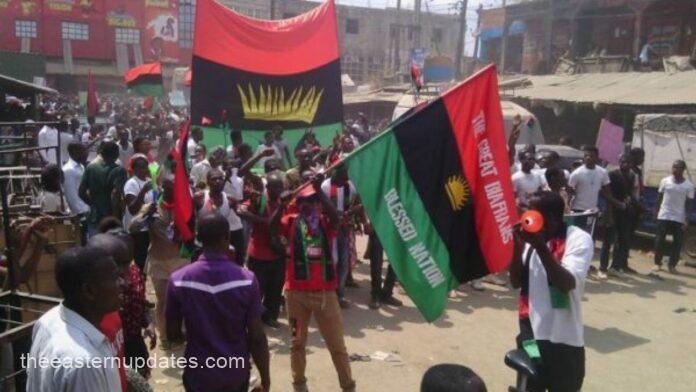|
Listen to article
|
The decision by the Indigenous people of Biafra (IPOB) to dialogue with the Federal Government over referendum has elicited reactions from some Igbo stakeholders.
The leaders, who insisted on political dialogue to end agitations by some Southeast groups, including IPOB, said no sensible Igbo would want the Southeast to exit Nigeria.
The leaders include a one-time Ebonyi State Information Commissioner Chief Abia Onyike; President-General of the Coalition of Southeast Youth Leaders (COSEYL), Goodluck Ibem, a political analyst, Williams Iheakolam an Ohanaeze Ndigbo official as well as an elder statesman, who asked not to be named.
In a statement on Saturda, IPOB Spokesperson, Emma Powerful had declared that the group remained ‘open for negotiations and dialogue on peaceful exit of Biafra from Nigeria through a United Nations -supervised referendum.’
‘IPOB is ready to meet with the Nigeria government any day they are ready for negotiations on the Biafra referendum,’ Powerful said.
But the Igbo leaders said what most Igbo, including their apex socio-cultural organisation, have always clamoured for was restructuring and not a referendum.
Read Also: Biafra Referendum: IPOB Signals Willingness For Dialogue
Chief Onyike, who is the acting secretary-general of Alaigbo Development Foundation (ADF), said it was imperative and urgent for the Federal Government to dialogue with all ethnic nationalities in the country so as to forge a way forward.
Expressing pessimism on government’s readiness to negotiate with IPOB, Onyike called for a return to regional autonomy as was in place in the First Republic.
He said: ‘That (referendum) has always been the view of IPOB but does the Nigerian Government believe in such (referendum)? The answer is no.
”The problem now is that the right-wing coalition ruling Nigeria does not believe in negotiating with groups agitating for self-determination.
‘Nigerian rulers should engage the Igbo and others seeking self-actualisation in dialogue since they have continued to show them that they are second class citizens in the Nigerian federation.
‘There should be a reconstitution of the Nigerian state. We should go away from this monolithic federation for regional autonomy as was the case in 1960-1966. The present situation is too oppressive and suffocating.’
COSEYL President Ibem said that ‘it is the way Igbo are maltreated that gave rise to agitation.
‘If the resources and political positions in the country are evenly spread, nobody sane person would wish to exit Nigeria.
‘It is because of injustice and unfair treatment that is the bane of separatist struggle all over the world. If things are done well everybody will be happy and feel part of the nation.’
On his part, Iheakolam said he had posited on several occasions that the solution to the crisis in the southeast could be solved through ‘political discussion.’
‘I am and have been one of the people who believe that the crisis in the Southeast and the continued detention of Nnamdi Kanu by the DSS will be solved through a political discussion.
‘I want to urge the federal lawmakers and governors from the Southeast to cash into the opportunity to push for a discussion between the federal government and the IPOB.
‘It was the same call that the elder statesman, (Sam) Mbadiwe made when some stakeholders from the southeast visited then President Muhammadu Buhari where he asked Buhari to hand Kanu over to him, which never happened.
‘That alone could have helped to quell the agitation, nuisance and bloodletting as seen in the southeast by a splinter IPOB group.
‘President Bola Ahmed Tinubu that I know knows that the only solution to the trouble in the southeast will be settled politically.
‘The Southeast has lost a lot, we need to come to a roundtable regardless of our political and religious affiliations to think the peace of the Southeast first.’
The Ohanaeze official, who pleaded anonymity, said Ohanaeze had been consistent with calls for the restructuring of Nigeria to end the marginalisation of some sections of the country.
Lamenting that the ‘huge marginalisation’ of the Igbo dates back to the 1960s, he wondered why successive governments had not addressed the issues causing agitations by some groups.
He said that Nigeria is not properly structured hence the need for its restructuring.
























